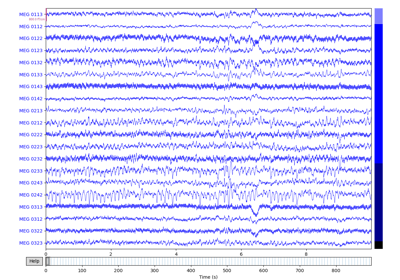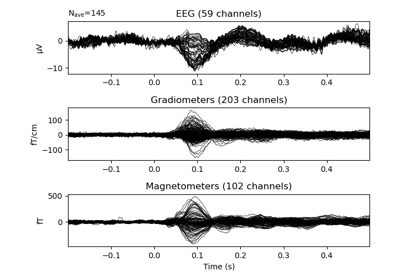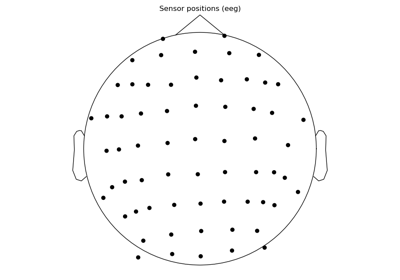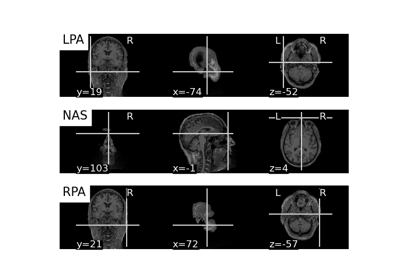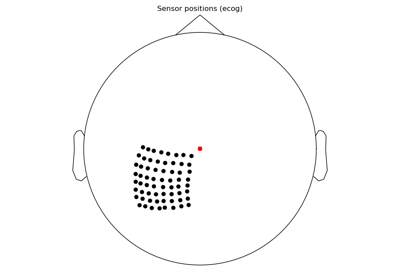mne_bids.BIDSPath¶
-
class
mne_bids.BIDSPath(subject=None, session=None, task=None, acquisition=None, run=None, processing=None, recording=None, space=None, split=None, root=None, suffix=None, extension=None, datatype=None, check=True)[source]¶ Create a BIDS path.
BIDS filename prefixes have one or more pieces of metadata in them. They must follow a particular order, which is followed by this function. This will generate the prefix for a BIDS filename that can be used with many subsequent files, or you may also give a suffix that will then complete the file name.
BIDSPath allows dynamic updating of its entities in place, and operates similar to
pathlib.Path.Note that not all parameters are applicable to each suffix of data. For example, electrode location TSV files do not need a “task” field.
- Parameters
- subjectstr | None
The subject ID. Corresponds to “sub”.
- sessionstr | None
The session for a item. Corresponds to “ses”.
- taskstr | None
The task for a item. Corresponds to “task”.
- acquisition: str | None
The acquisition parameters for the item. Corresponds to “acq”.
- runint | None
The run number for this item. Corresponds to “run”.
- processingstr | None
The processing label for this item. Corresponds to “proc”.
- recordingstr | None
The recording name for this item. Corresponds to “rec”.
- spacestr | None
The coordinate space for an anatomical file. Corresponds to “space”.
- splitint | None
The split of the continuous recording file for
.fifdata. Corresponds to “split”.- suffixstr | None
The filename suffix. This is the entity after the last
_before the extension. E.g.,'channels'. The following filename suffix’s are accepted: ‘meg’, ‘markers’, ‘eeg’, ‘ieeg’, ‘T1w’, ‘participants’, ‘scans’, ‘electrodes’, ‘coordsystem’, ‘channels’, ‘events’, ‘headshape’, ‘digitizer’, ‘behav’, ‘phsyio’, ‘stim’- extensionstr | None
The extension of the filename. E.g.,
'.json'.- datatypestr
The “data type” of folder being created at the end of the folder hierarchy. E.g.,
'anat','func','eeg','meg','ieeg', etc.- rootstr | pathlib.Path | None
The root for the filename to be created. E.g., a path to the folder in which you wish to create a file with this name.
- checkbool
If True enforces the entities to be valid according to the current BIDS standard. Defaults to True.
Examples
>>> bids_path = BIDSPath(subject='test', session='two', task='mytask', suffix='ieeg', extension='.edf') >>> print(bids_path.basename) sub-test_ses-two_task-mytask_ieeg.edf >>> bids_path BIDSPath(root: None, basename: sub-test_ses-two_task-mytask_ieeg.edf) >>> # copy and update multiple entities at once >>> new_bids_path = bids_path.copy().update(subject='test2', session='one') >>> print(new_bids_path.basename) sub-test2_ses-one_task-mytask_ieeg.edf >>> # printing the BIDSPath will show relative path when >>> # root is not set >>> print(new_bids_path) sub-test2/ses-one/ieeg/sub-test2_ses-one_task-mytask_ieeg.edf >>> new_bids_path.update(suffix='channels', extension='.tsv') >>> # setting suffix without an identifiable datatype will >>> # result in a wildcard at the datatype directory level >>> print(new_bids_path) sub-test2/ses-one/*/sub-test2_ses-one_task-mytask_channels.tsv >>> # set a root for the BIDS dataset >>> new_bids_path.update(root='/bids_dataset') >>> print(new_bids_path.root) /bids_dataset >>> print(new_bids_path.basename) sub-test2_ses-one_task-mytask_ieeg.edf >>> print(new_bids_path) /bids_dataset/sub-test2/ses-one/ieeg/sub-test2_ses-one_task-mytask_ieeg.edf >>> print(new_bids_path.directory) /bids_dataset/sub-test2/ses-one/ieeg/
- Attributes
entitiesdictReturn dictionary of the BIDS entities.
- datatypestr | None
The data type, i.e., one of
'meg','eeg','ieeg','anat'.basenamestrPath basename.
- rootpathlib.Path
The root of the BIDS path.
directorypathlib.PathGet the BIDS parent directory.
fpathpathlib.PathFull filepath for this BIDS file.
- checkbool
If
True, enforces the entities to be valid according to the BIDS specification. The check is performed on instantiation and anyupdatefunction calls (and may be overridden in the latter).
Methods
copy()Copy the instance.
Find the corresponding empty-room file of an MEG recording.
match()Get a list of all matching paths in the root directory.
mkdir([exist_ok])Create the directory structure of the BIDS path.
update(*[, check])Update inplace BIDS entity key/value pairs in object.
-
property
basename¶ Path basename.
-
property
directory¶ Get the BIDS parent directory.
If
subject,sessionanddatatypeare set, then they will be used to construct the directory location. For example, ifsubject='01',session='02'anddatatype='ieeg', then the directory would be:<root>/sub-01/ses-02/ieeg
- Returns
- data_pathpathlib.Path
The path of the BIDS directory.
-
property
entities¶ Return dictionary of the BIDS entities.
-
find_empty_room()[source]¶ Find the corresponding empty-room file of an MEG recording.
This will only work if the
.rootattribute of themne_bids.BIDSPathinstance has been set.- Returns
- BIDSPath | None
The path corresponding to the best-matching empty-room measurement. Returns None if none was found.
-
property
fpath¶ Full filepath for this BIDS file.
Getting the file path consists of the entities passed in and will get the relative (or full if
rootis passed) path.- Returns
- bids_fpathpathlib.Path
Either the relative, or full path to the dataset.
-
match()[source]¶ Get a list of all matching paths in the root directory.
Performs a recursive search, starting in
.root(if set), based onBIDSPath.entitiesobject.- Returns
- bids_pathslist of BIDSPath
The matching paths.
-
property
meg_calibration_fpath¶ Find the matching Elekta/Neuromag/MEGIN fine-calibration file.
This requires that at least
rootandsubjectare set, and thatdatatypeis either'meg'orNone.- Returns
- pathpathlib.Path | None
The path of the fine-calibration file, or
Noneif it couldn’t be found.
-
property
meg_crosstalk_fpath¶ Find the matching Elekta/Neuromag/MEGIN crosstalk file.
This requires that at least
rootandsubjectare set, and thatdatatypeis either'meg'orNone.- Returns
- pathpathlib.Path | None
The path of the crosstalk file, or
Noneif it couldn’t be found.
-
mkdir(exist_ok=True)[source]¶ Create the directory structure of the BIDS path.
- Parameters
- exist_okbool
If
False, raise an exception if the directory already exists. Otherwise, do nothing (default).
- Returns
- selfinstance of BIDSPath
The BIDSPath object.
-
update(*, check=None, **kwargs)[source]¶ Update inplace BIDS entity key/value pairs in object.
runandsplitare auto-parsed to have two numbers when passed in. For example, ifrun=1, then it will becomerun='01'.Also performs error checks on various entities to adhere to the BIDS specification. Specifically: -
suffixshould be one of:anat,eeg,ieeg,meg-extensionshould be one of the accepted file extensions in the file path:.con,.sqd,.fif,.pdf,.ds,.vhdr,.edf,.bdf,.set,.edf,.set,.mef,.nwb-suffixshould be one acceptable file suffixes in:meg,markers,eeg,ieeg,T1w,participants,scans,electrodes,channels,coordsystem,events,headshape,digitizer,behav,phsyio,stim- Parameters
- checkNone | bool
If a boolean, controls whether to enforce the entities to be valid according to the BIDS specification. This will set the
.checkattribute accordingly. IfNone, rely on the existing.checkattribute instead, which is set uponBIDSPathinstantiation. Defaults toNone.- **kwargsdict
It can contain updates for valid BIDS path entities: ‘subject’, ‘session’, ‘task’, ‘acquisition’, ‘processing’, ‘run’, ‘recording’, ‘space’, ‘suffix’ or updates for ‘root’ or ‘datatype’.
- Returns
- bidspathinstance of BIDSPath
The updated instance of BIDSPath.
Examples
If one creates a bids basename using
mne_bids.BIDSPath():>>> bids_path = BIDSPath(subject='test', session='two', task='mytask', suffix='channels', extension='.tsv') >>> print(bids_path.basename) sub-test_ses-two_task-mytask_channels.tsv >>> # Then, one can update this `BIDSPath` object in place >>> bids_path.update(acquisition='test', suffix='ieeg', extension='.vhdr', task=None) >>> print(bids_path.basename) sub-test_ses-two_acq-test_ieeg.vhdr
